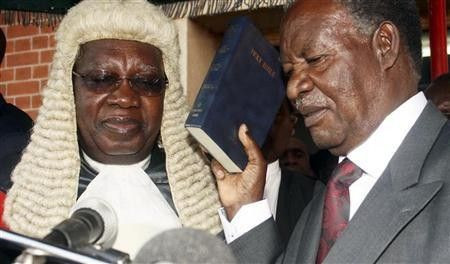Zambia's Sata takes aim at graft, high bank rates

New Zambian President Michael Sata launched a probe on Friday into last year's sale of telecoms operator Zamtel and vowed to keep a close eye on copper exports, while finance minister Alexander Chikwanda told banks to cut interest rates.
In a sign of Sata's administration acting quickly on populist campaign promises, Chikwanda, who was only appointed on Thursday, said lending rates in Africa's biggest copper producer were inconsistent with inflation, which hit 8.8 percent in September.
Zambians, especially women and the youth have bright ideas and business proposals but they cannot implement them because of high interest rates on money available in the banking and financial services sector, he said in a statement.
The government would push commercial lenders to cut the current prohibitive interest rates in line with a broader pro-growth policy stance.
Any weakening of policymakers' resolve in keeping inflation in single digits could undermine faith in the kwacha currency, which is flat on the year against a surging dollar.
Although only one-week in the job, Sata has wasted no time in kicking out all vestiges of the previous administration of Rupiah Banda, whose Movement for Multi-party Democracy (MMD) had been in charge of the former British colony for 20 years.
On Thursday he fired respected central bank governor Caleb Funadanga, a move that caused moderate concern among the international investors who had come to trust Fundanga during his nearly 10 years at the helm of the Bank of Zambia.
In line with his zealous anti-corruption pledges, he has also thrown a spotlight on a number of deals executed under Banda, who was criticised for taking a relatively lax line on graft.
As well as investigating state fuel tenders, Sata said he would look at last year's sale of state-owned fixed line operator Zamtel to Libya's LAP Green Networks for $257 million -- a deal that Sata questioned from the start.
Sata, who has also been concerned -- and analysts say with good reason -- about copper exporters misreporting the amount of ore leaving the country, tightened up any loopholes by saying that henceforth all export payments would have to be routed via the central bank.
Nothing will be exported out of Zambia unless confirmation of payments is received from the Bank of Zambia, Sata told a news briefing after swearing in his new cabinet.
The 74-year-old swept to power last week on the back of voters looking for change in a country that has seen its economy grow but who felt the riches from its mines had not made their way to the people or created enough jobs.
Sata has long questioned copper export data. Copper accounts for three-quarters of Zambia's export earnings, but the mining industry contributes only about 10 percent of its tax revenue.
Banda told Reuters in March audits had revealed that the Zambian mining sector owed up to $200 million in unpaid taxes.
According to Zambian figures, much of the copper exports are destined for Switzerland but little of them show up in Swiss customs data, raising questions about transparency.
© Copyright Thomson Reuters {{Year}}. All rights reserved.





















